 Petzlover
Petzlover Australian Red Heeler is originated from Australia but Smalandsstovare is originated from Sweden. Both Australian Red Heeler and Smalandsstovare are having almost same height. Both Australian Red Heeler and Smalandsstovare are having almost same weight. Both Australian Red Heeler and Smalandsstovare has almost same life span. Both Australian Red Heeler and Smalandsstovare has almost same litter size. Australian Red Heeler requires Moderate Maintenance. But Smalandsstovare requires Low Maintenance
Australian Red Heeler is originated from Australia but Smalandsstovare is originated from Sweden. Both Australian Red Heeler and Smalandsstovare are having almost same height. Both Australian Red Heeler and Smalandsstovare are having almost same weight. Both Australian Red Heeler and Smalandsstovare has almost same life span. Both Australian Red Heeler and Smalandsstovare has almost same litter size. Australian Red Heeler requires Moderate Maintenance. But Smalandsstovare requires Low Maintenance
 When George Hall arrived in the New South Wales Colony in 1802 he set about ‘creating’ a tough working- or herding dog. By crossing Australia’s native Dingoes with Collies as well as with other herding dogs, the robust Red Heeler, also known as the Australian Cattle Dog came into being. Today he is a thick-set dog, ideally suited to working livestock.
When George Hall arrived in the New South Wales Colony in 1802 he set about ‘creating’ a tough working- or herding dog. By crossing Australia’s native Dingoes with Collies as well as with other herding dogs, the robust Red Heeler, also known as the Australian Cattle Dog came into being. Today he is a thick-set dog, ideally suited to working livestock.
Ranchers, particularly, were impressed with the breed’s toughness and they were sought after on cattle stations. The name actually comes from them when the dogs are herding animals, they nip at their heels to get them moving.
The Blue Heeler and the Red Heeler breed are the exact same dog, but just different colors. These Australian cattle dogs originated in Australia in the mid-1800s and adapted well to the harsh desert environment of the outback.
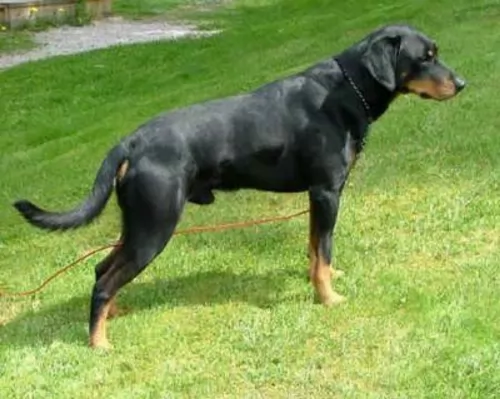 The Smålandsstövare has got quite a long history and dates back to the 1600s. He is the smallest of the Swedish hound breeds. This is a scenthound.
The Smålandsstövare has got quite a long history and dates back to the 1600s. He is the smallest of the Swedish hound breeds. This is a scenthound.
Hounds similar to the Smålandsstövare were bred with European hounds and then brought to Småland and bred with local spitz-type farm dogs to create the foundation stock for the Smålandsstövare.
The dog was used to hunt but nearly died out in the 20th century, but breeders restored it and the first official standard emerged by the Swedish Kennel Club in 1921.
The Smålandsstövare is a rare dog breed but it is recognized by the American Rare Breed Association as well as other major kennel clubs, one of which is the Federation Cynologique Internationale as well as the United Kennel Club.
 The Red Heeler or Australian Cattle Dog is a sturdy, muscular dog with ears that are pricked and with dark, alert eyes. The tail is long. The neck, shoulders and legs of the Red Heeler are strong and muscular. The dog is longer than tall – the length of the body is greater than the height at the withers. A well fed, well exercised, well cared for Red Heeler will weight roughly 15–22 kilograms.
The Red Heeler or Australian Cattle Dog is a sturdy, muscular dog with ears that are pricked and with dark, alert eyes. The tail is long. The neck, shoulders and legs of the Red Heeler are strong and muscular. The dog is longer than tall – the length of the body is greater than the height at the withers. A well fed, well exercised, well cared for Red Heeler will weight roughly 15–22 kilograms.
There are 2 coat colours of the Reeler – red and blue, but there are are lesser varieties such as chocolate, cream, blue mottled, brindle and some with white markings. It is interesting to note that with both the Red- and the Blue Heeler, puppies are generally born white, with the coat turning to red as they mature.
These Australian Cattle Dogs display patches of solid colour, and you might well find masks over one or both eyes and a white tip to the tail. Both the Red and Blue Heeler can have a white star on the forehead which is referred to as the Bentley Mark. The Heelers have a double coat - short, straight outer hairs while the undercoat is short, fine and dense. Despite their short coat, they shed a lot.
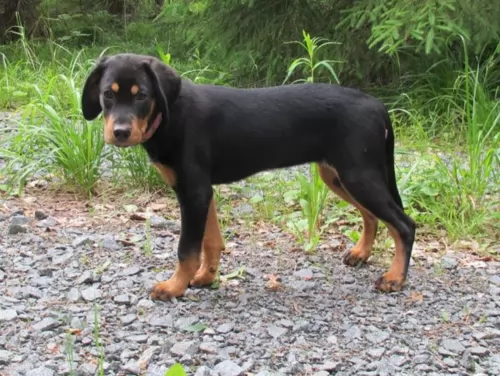 The Smålandsstövare is a muscled, compact looking dog. The double coat is shortish to medium length and is thick and quite coarse to the touch. He sheds seasonally. The coat is usually black with tan markings.
The Smålandsstövare is a muscled, compact looking dog. The double coat is shortish to medium length and is thick and quite coarse to the touch. He sheds seasonally. The coat is usually black with tan markings.
The high set ears are medium length and floppy, the head is slim and the tail can be naturally short. Sometimes the tail is long and can be slightly curved in the spitz-like sabre fashion.
The eyes are brown and friendly. The height of these dogs is about 46 to 54cm and he weighs anything from 15 to 18kg.
Usually a well behaved, quiet, calm, gentle dog, the Smålandsstövare takes his role as guard dog seriously, wanting to protect his family.
His good temperament ensures he gets on well with all members of the family. He is full of energy and will need to be exercised well, whether it be ball games in the garden, a walk around the block, a run in the park or joining his family on hikes and camping trips.
It is why he won’t settle down well on a small property in the city. He needs larger premises to expend his energy, and if in cramped premises without exercise, he may resort to barking and whining and this may well drive your neighbors bats.
Training and socializing your Smålandsstövare will be necessary and it should be easy as he is intelligent.
 Your Australian Red Heeler needs plenty of exercise but also plenty of companionship too from his human family. He is an affectionate, playful pet but is reserved with people he doesn’t know. When socialized he is patient with children in the home but he does still have the tendency to herd them and nip at their heels. The dog builds up a strong bond with his human family, and is protective toward them, being happy to be close to his owner’s side.
Your Australian Red Heeler needs plenty of exercise but also plenty of companionship too from his human family. He is an affectionate, playful pet but is reserved with people he doesn’t know. When socialized he is patient with children in the home but he does still have the tendency to herd them and nip at their heels. The dog builds up a strong bond with his human family, and is protective toward them, being happy to be close to his owner’s side.
Red Heelers need activities and lots of room to play, and they therefore won’t adapt to apartment living. If you don’t live on a farm, don’t neglect your working dog as he will need lots of rough and tumble games and activities to keep him from boredom. Treat your Australian Red Heeler with the love, patience and kindness and you’ll bring out the very best from this active, loyal fur-friend of yours.
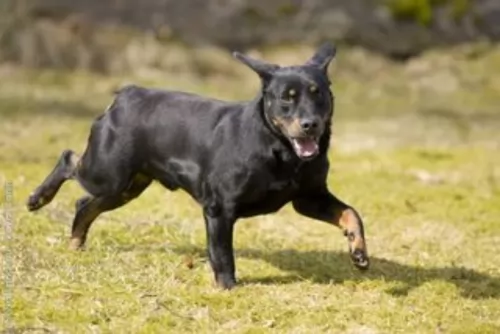 The Smålandsstövare is a robust dog with a lot of stamina. He will be wanting a lot of exercise and is ideal as a pet in the suburbs or the countryside but not ideal for city living.
The Smålandsstövare is a robust dog with a lot of stamina. He will be wanting a lot of exercise and is ideal as a pet in the suburbs or the countryside but not ideal for city living.
He makes a wonderful family pet, forming strong bonds with his owners. He makes an excellent watchdog too wanting to protect his family, and with this amicable, calm dog, you’re going to have a true friend.
 The Australian Cattle Dog is quite often affected by progressive retinal atrophy, an eye condition where the rods and cones in the retina of the eye deteriorate later in life, and it could lead to blindness. This eye illness is an autosomal recessive trait, and even if the dog doesn’t develop the condition himself, he can be a carrier of the affected gene.
The Australian Cattle Dog is quite often affected by progressive retinal atrophy, an eye condition where the rods and cones in the retina of the eye deteriorate later in life, and it could lead to blindness. This eye illness is an autosomal recessive trait, and even if the dog doesn’t develop the condition himself, he can be a carrier of the affected gene.
The Heeler is just bursting with personality and energy and a study of dogs diagnosed at veterinary colleges described fractures and ligament tears as one of the most common conditions treated with the Australian Red Heeler.
You love your Australian Red Heeler and you want to take good care of him. Check with your vet because at 8 weeks he should be starting with his first puppy vaccinations.
To keep your best friend healthy and happy, watch his diet, ensure he gets plenty of exercise, brush his teeth regularly to remove plaque build-up, and always call your veterinarian when you see he is ill and isn’t his usual boisterous self.
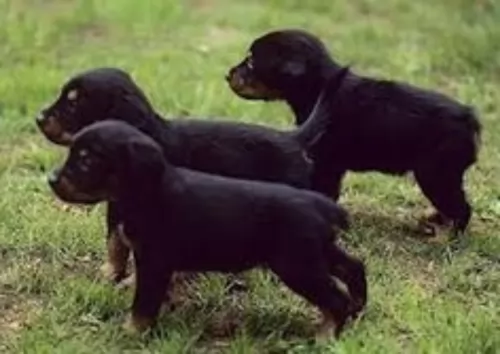 The Smålandsstövare is a rare dog breed and not much is known about congenital conditions to which he may be particularly prone.
The Smålandsstövare is a rare dog breed and not much is known about congenital conditions to which he may be particularly prone.
With good care he can reach 14 or 15 years of age. The floppy ears put him at risk for ear infections, while other conditions to watch for include hip dysplasia, cancer, bloat and obesity.
If you see your dog shaking his head or pawing at his ears, look inside because the ears may be red and inflamed. It is important to get help quickly for ear problems in dogs.
Ear canals are sensitive so if you don’t want to clean the ear and work on it yourself it is important to get your pet to the vet. The vet will clean your dog’s ears and also prescribe antibiotics.
For future treatment, you will need to clean your dog’s ears and keep them dry. If you don’t want to do this yourself, make sure to get him to professional groomers who will do this for you.
 The Australian Red Heeler is a low maintenance dog. He does shed quite a bit so you’ll need to brush his coat at least twice a week to remove loose hairs and to keep his coat lustrous. When your dog has been in a particularly dusty area, you you wipe his coat down with a damp cloth. As with all dogs, you’ll want to check his teeth, ears, eyes and nails regularly to avoid health problems.
The Australian Red Heeler is a low maintenance dog. He does shed quite a bit so you’ll need to brush his coat at least twice a week to remove loose hairs and to keep his coat lustrous. When your dog has been in a particularly dusty area, you you wipe his coat down with a damp cloth. As with all dogs, you’ll want to check his teeth, ears, eyes and nails regularly to avoid health problems.
If you care for your working- and herding dog you’ll train him to that he becomes a good family dog and companion. The Red Heeler has plenty of energy and stamina and if he grows up untrained and un-socialized, you could see him becoming aggressive towards other animals and even your own children. He certainly becomes over-protective of his territory if not socialized. Train him as he is an intelligent breed and responds well to training.
Any vet will tell you of the critical importance of a proper diet and exercise routine for your dog. He’s an active, smart dog with loads of energy and you want to keep his diet consistent with this energy. Speak to your vet about what food would suit your pet best, because a high quality diet appropriate to his age, his body size and his energy levels will be important. Along with high quality foods which include a good intake of raw meat, your dog must always have access to a bowl of fresh, cool water.
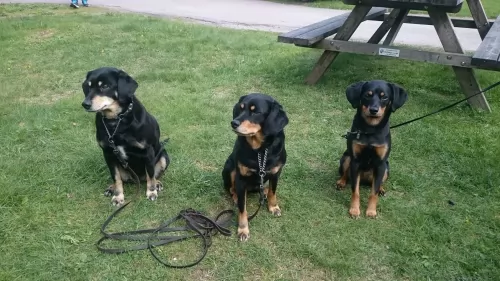 Choosing a good diet is imperative for the Smålandsstövare. Choose a commercially manufactured dog food high in vitamins and minerals.
Choosing a good diet is imperative for the Smålandsstövare. Choose a commercially manufactured dog food high in vitamins and minerals.
Give your dog a treat by providing him with some home-made food. It can be added into the dry kibble about twice a week as a treat. Boil brown rice and chicken in a pot and add in sweet potatoes, carrots and spinach. Chop all this up and give it to your dog in small portions. Also try to include some raw meat into the diet.
The Smålandsstövare is a very energetic breed and he is going to require some vigorous exercise every day. Take him for walks, allow him to run with you when you cycle or jog or take him swimming.